What Are the Best Project Management Tools?
When you onboard a new hire, it's a project itself. When you report on company metrics, you're basically summarizing projects outcomes. Having a meeting? I can assume it's to discuss a project. Scoping a new feature or launching a marketing campaign always come with managing projects. Everything your doing at work is a project, right?
Any project manager will tell you that a shocking amount of tasks go into even the most straightforward projects. Combine this with the increased popularity of remote teams, the varying interests of diverse stakeholders and team members, new trends like the agile project management approach, scrums & critical path methods and subtasks upon subtasks... let's just say that project management can get overwhelming, fast.
That's where project management apps and tools come in. Fortunately for project managers and project teams alike, technology has provided countless innovative solutions to common project management woes. It's easier than ever to develop efficient, intuitive project management systems. Much of that development is done online.
By now you might be wondering what kinds of project management tools are out there to help with your project tasks. The truth is, the options are almost limitless. That makes it difficult to determine what will really help you with your new project.
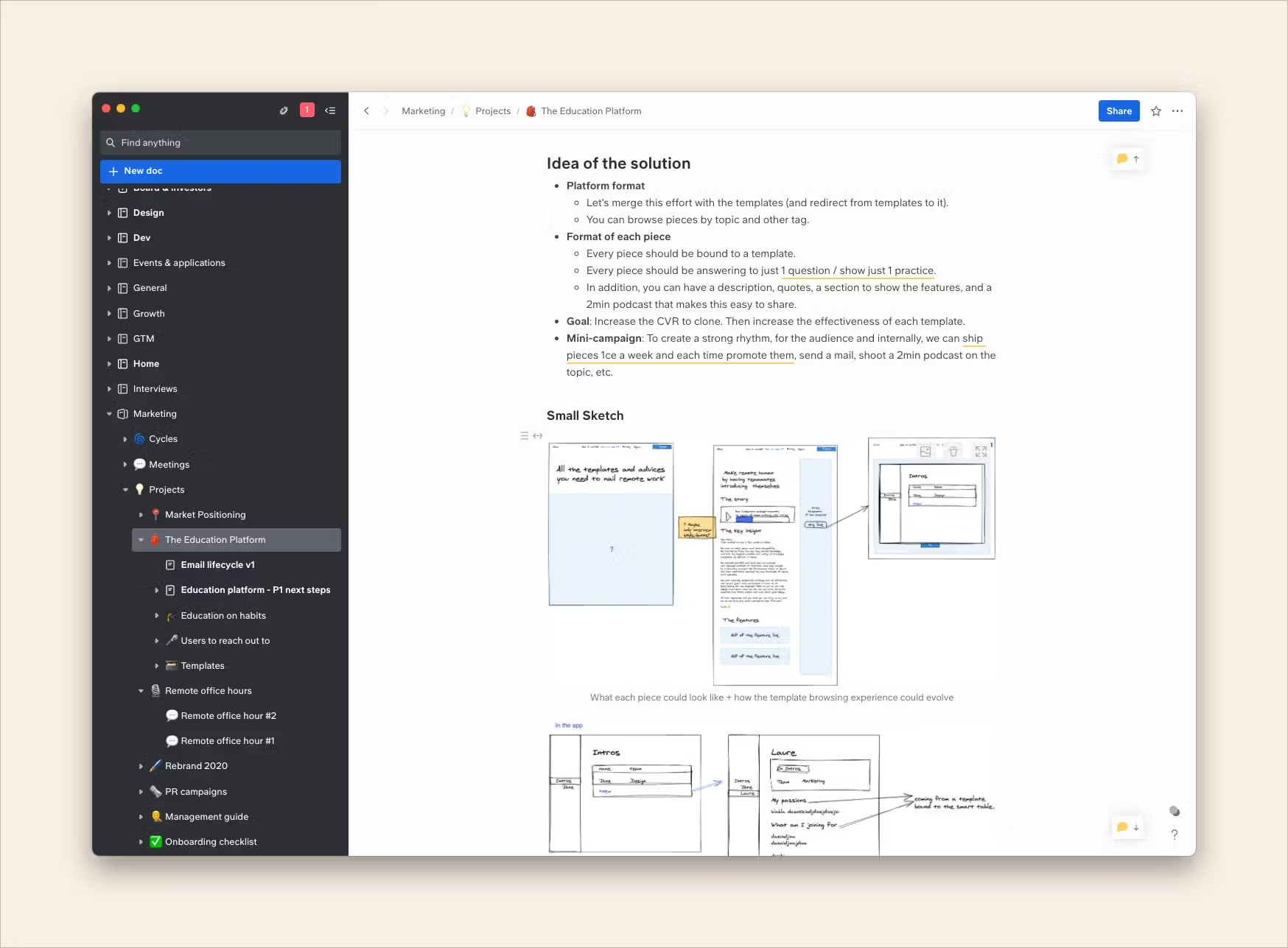
Successfully working on an idea or collaborating on a project is not about moving a card on a kanban. Concise & efficient doesn't mean visual and short. Don't take shortcuts, don't take for granted that everyone will understand your 1-line chat, your graph or your database.
Especially in remote companies, better managing your project is about having a meaningful communication. Think of writing, sketching, recording yourself in video, sharing progress, documenting work in-depth and making. Slite is the #1 place for all your internal communication, project collaboration, hiring and more.
We've done the groundwork for you and put together a handy list of the 12 top project management tools that you and your team should be using in 2022. These project management tools will help you tackle even the most complex projects, so take a browse through our list, try out the options that align with your project plan, and marvel how quickly you'll be getting things done.
1. Slite: Meaningful communication to manage your projects
If you're looking for a user-friendly tool that facilitates collaborative content development and remote teamwork, Slite isa must for you and your team. Slite acts as a collective workspace that allows large and small teams alike to work together seamlessly without having to meet face-to-face.
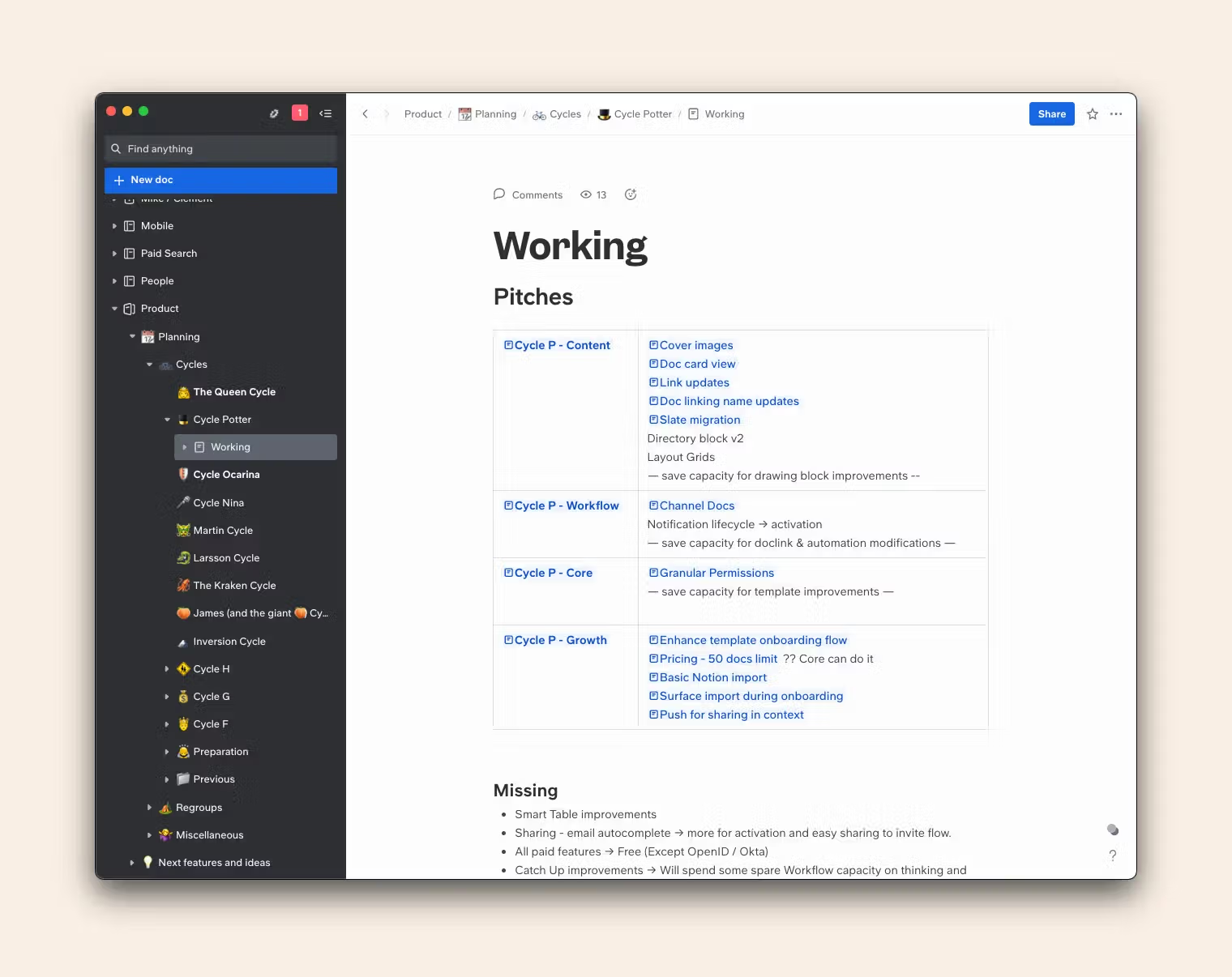
Collaborative Templates
Slite is perfect to use in a wide variety of project types and industries. It also offers an array of customizable project templates to save you time when you get started. They're constantly putting out new templates, but some of the categories in their current selection include:
- Project management & documentation
- Marketing
- Product development & management
- Remote work
- Design
- Human resources & management
If you’re ready to give Slite a try:
- We have a free plan you can use to get your bearings
- To take advantage of our full range of features, standard plan starts from $8 USD per active user per month
- We also have enterprise plans available upon consultation
2. Monday.com: Streamline your workflows
Monday.com is one of the most popular general purpose project management tools out there, mainly rivalled by Asana. It acts as a digital workspace that enables professional teams to organize and manage their workflows, tasks, projects and general collaboration.
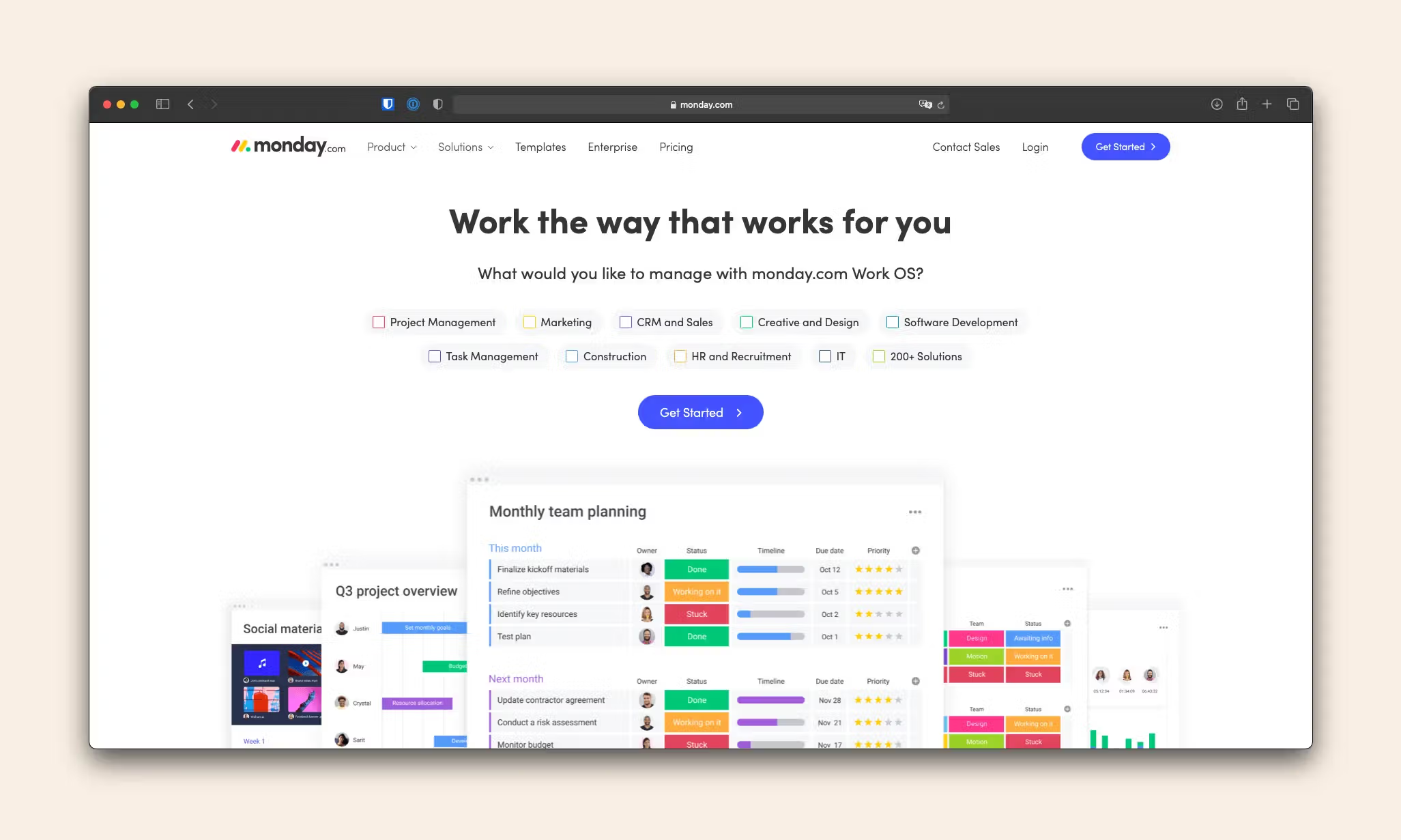
User-friendly
- Everything in your Monday.com account is centralized on one main visual board.
- Start from scratch, choose one of their 200+ templates, or select one of their 30+ column types.
- Drag and drop to develop your ideal workflow.
- Beautiful, intuitive interface that doesn’t require any special training to use.
- Works seamlessly across a variety of devices.
- Has iOs and Android apps available.
Unique Integrations
It's also easy to set up automations and integrations on Monday.com. Some of the most popular options include:
- Email marketing: Outlook, Gmail
- Project management: Microsoft teams
- File management: Dropbox, Google Drive, OneDrive
- Communication & messaging apps: Slack, Zoom
- Social media: LinkedIn
- Other: Google Calendar, Zapier, Excel
Last but not least, Monday.com allows you to view your data exactly how you want to... whether that's on a Kanban board, calendar, timeline, Gantt chart, map, form, workload or main view format.
Pricing
Try it out with a free 14-day trial. After that, basic plans start from €24 per user per month and go up to €48 per user per month.
3. Basecamp: Opinionated project management software for smaller teams
Basecamp is another classic project management tool, but what really sets it apart is its communication functionalities. That's what earned it a mention here and makes it competitive with other solutions. It combines project management with internal communication, making it perfect for remote teams of all kinds.
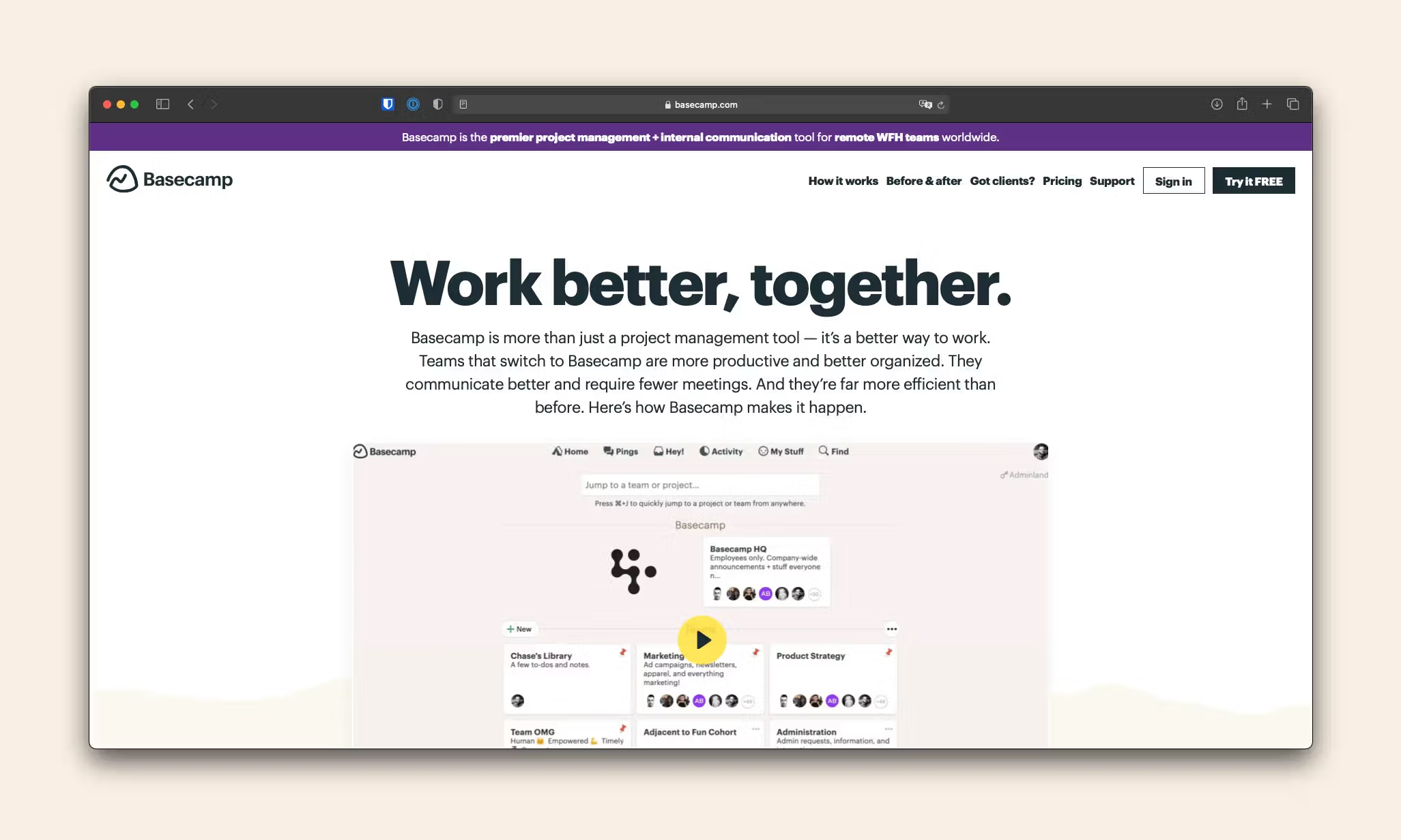
Team accountability
Basecamp acts as a centralized space for your company's projects, teams and communications so you never lose track of any documents or important information. Basically, it helps you stay on top of project planning and keeping in touch. Some of the main tools you can find on your homepage include a message board, to-do lists, schedules, documents and files, group chats and automatic check ins. You can also use some of Basecamp time tracking integrations if you want to go a step further.
If you're looking for a comprehensive, intuitive project management solution for a remote team of any size, Basecamp could be perfect for you. They have a 30-day free trial and their paid plan starts at $99 flat per month for unlimited users.
An array of tools
Some of the main tools you can find on your homepage include:
- A message board
- To-do lists
- Schedules
- Documents and files
- Group chats
- Automatic check ins
Pricing
If you're looking for a comprehensive, intuitive project management solution for a remote team of any size, Basecamp could be perfect for you. They have a 30-day free trial and their paid plan starts at $99 USD flat per month for unlimited users.
4. Forecast App: Streamline your finances with AI
The Forecast App is another handy project management tool, but this time it has a focus on finances and operations. Forecast is tired of the same old necessity of copying and sending data between different softwares, systems and apps, so they're on a mission to simplify the management of businesses "from quote to invoice."
It’s a great tool for businesses of any size that need a straightforward way to get on top of their finances and accounting.
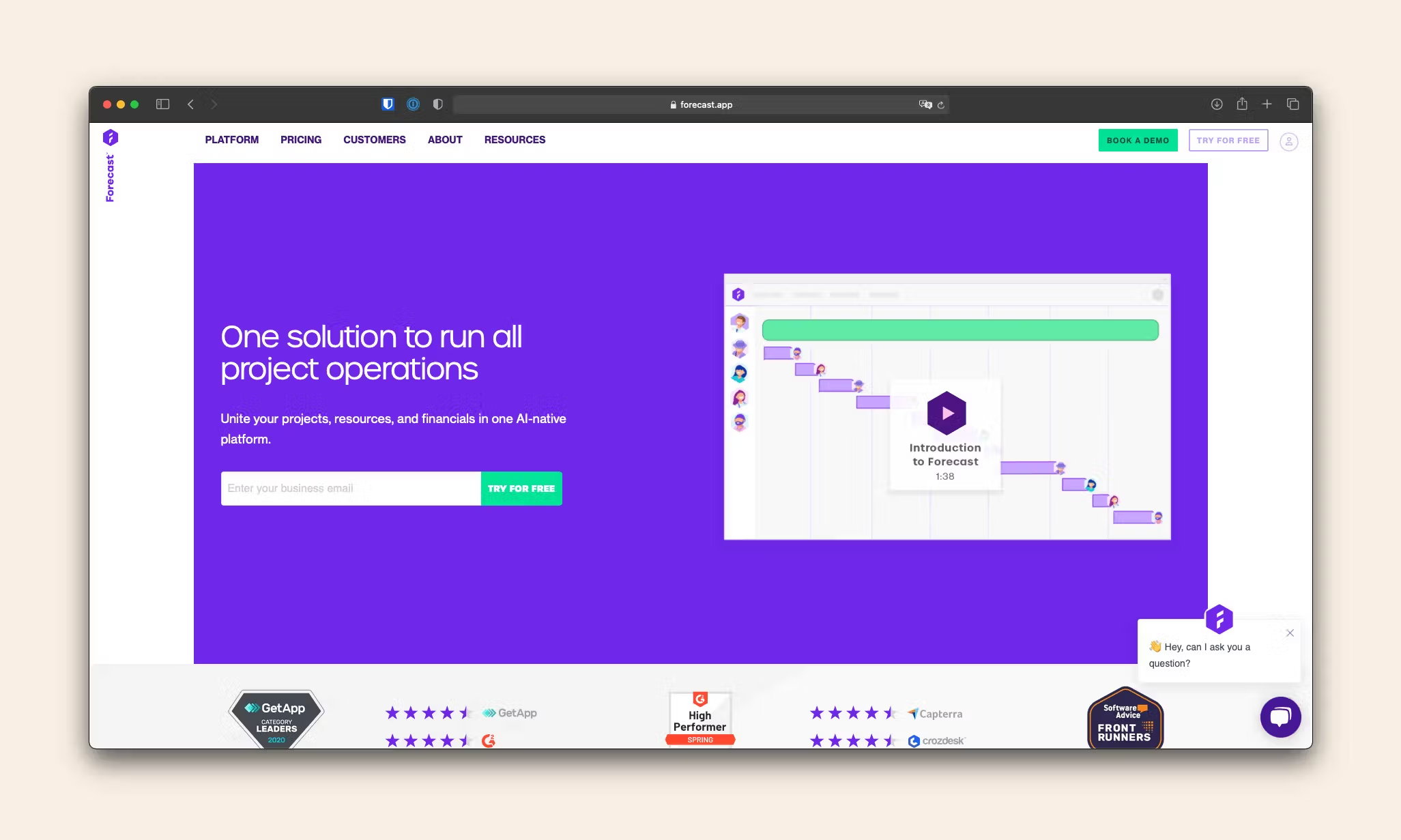
Our favorite features
The Forecast App claims to cut administrative work in half, and they absolutely do. They make this possible by harnessing the power of AI-based automations in innovative tools like:
- Automatic scheduling
- Timesheet suggestions (when employees track time, this app actually learns from their data)
- Resource allocation
- Budget estimations
Profitability is king
Because of their financial focus, The Forecast App is specifically designed to help you and your project team deliver profitable projects. Sounds pretty ideal, right? It has powerful accounting features that provide breakdowns of revenue, cost, profit and profit margins, which are visually laid out and easy to digest... even without significant accounting experience.
Real-time updates
Last, Forecast's project management functionalities help keep everything organized along the way. Staying on top of every aspect of your project is a breeze, right down to milestones, dependencies, deliverables, tasks and subtasks. Everything gets updated automatically and in real-time, so you'll always have access to up-to-date information and accurate project progress.
Pricing
Sound appealing? The Forecast App takes a little bit of training and time to master, but you can book a demo or sign up for a free trial to test out the waters. After that, their paid plans range between 27 and 46 EUR per seat, per month.
They're only 4 years old and are already used in over 40 countries around the world, so this project management newcomer is one to watch.
5. ProofHub: Simple, effective project planning
ProofHub markets itself as an all-in-one project planning software. Love it or hate it, ProofHub is a simple platform that has limited integrations and features. This is all done intentionally as they aim for new users to have no learning curve when they start using the software.
Basically, if you want a project management solution that isn't overly complicated or that you don't have to spend a lot of time familiarizing yourself with, this could be the perfect app for you.
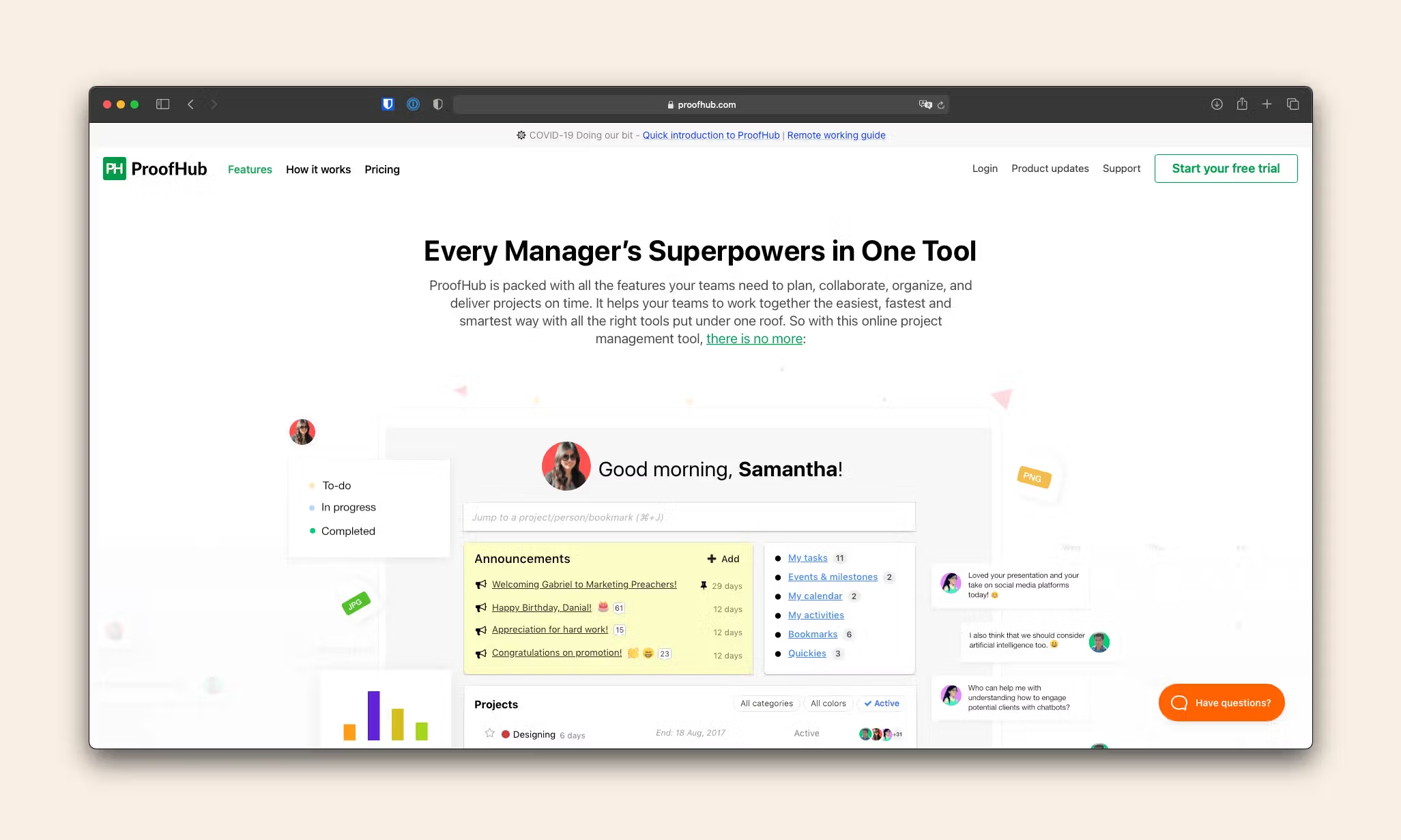
Great for freelancers
ProofHub's simplicity makes it perfect for freelancers and small teams, but it can also be used effectively for companies of all sizes. It's also affordable, with a free trial available and paid plans starting at $45 USD per month with unlimited users.
In terms of functionalities, ProofHub has all the project management basics. It acts as a centralized workspace where you can place your project's task lists, workflows, Gantt charts, documents, files, schedules and even chats.
The essential functionalities you really need
In terms of functionalities, ProofHub has all the project management basics. It acts as a centralized workspace where you can place your project's:
- Task lists
- Workflows
- Gantt charts
- Documents
- Files
- Schedules
- Chats
Pricing
Best of all, ProofHub is very affordable, with a free trial available and paid plans starting at $45 USD per month with unlimited users.
6. Airtable: User-friendly databases
At its core, Airtable is a beautiful marriage between a spreadsheet and a database. It allows you to organize pretty much any kind of information with the easily digestible appearance of a spreadsheet. However, it's functionality gets a level up as it also works as an interactive database.
Use Airtable for everything from organizing project information to internal company data to customer & CRM information (customer relationship management) and even plain old ideas.
Before you get intimidated, this isn't as complicated as it sounds. In fact, it has an easy-to-use user interface and is an incredibly powerful way to organize information.
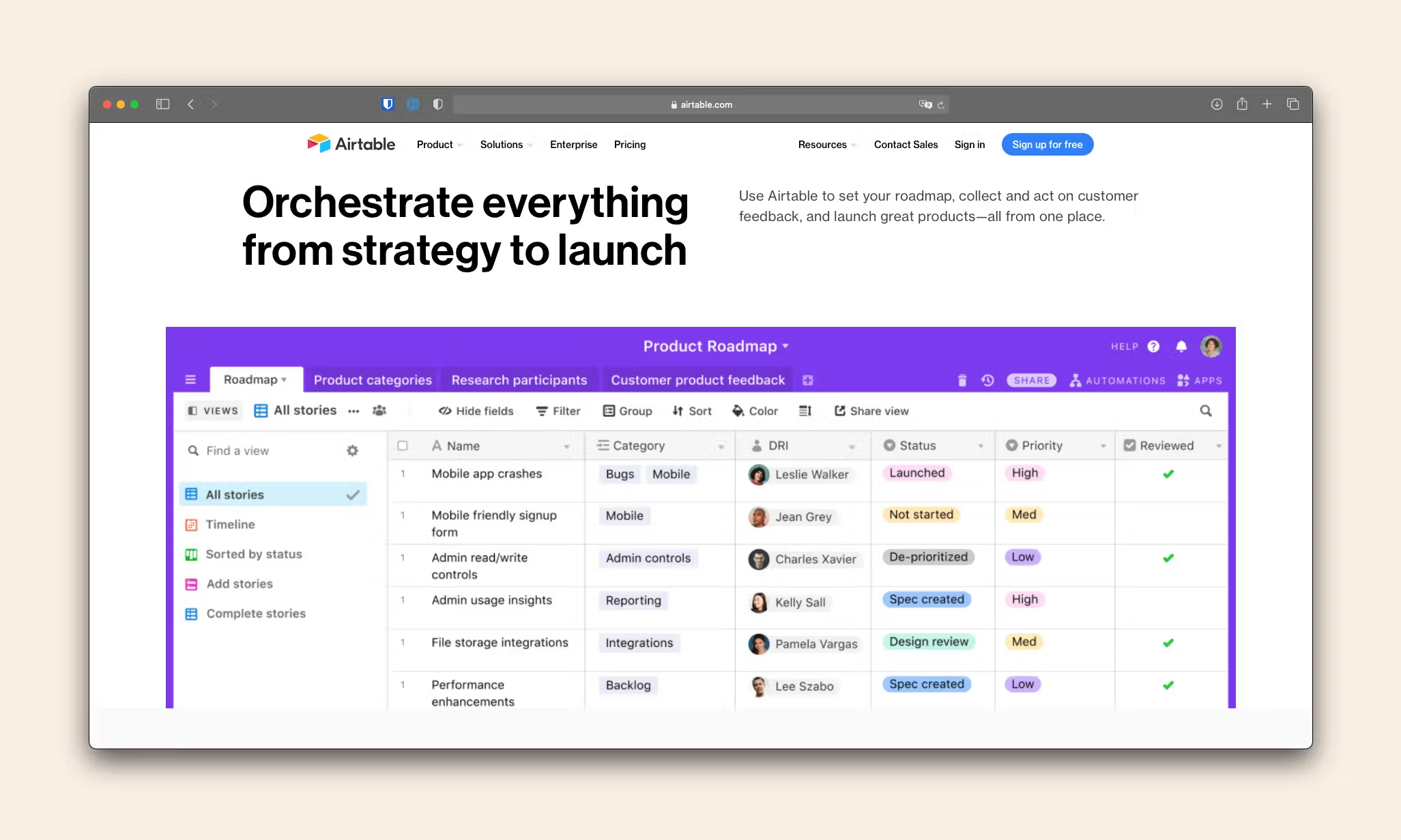
Keeps your data sorted and organized
- On Airtable, a singular database is referred to as a base.
- Airtable bases are unique because they can be customized with a wide variety of field types such as checklists, drop downs, priority levels, due dates, notes, links to associated tasks and drag-and-drop attachments.
- Bases can also be viewed in a more traditional grid format (much like an Excel sheet), as well as in more interactive calendar and gallery options.
- There's also the possibility to group and organize your data.
Ease to share data
Airtable is also easy to connect with your favourite web apps and has a powerful API. This enables you and your team to effortlessly share information between bases and external applications. Some popular apps have built-in integrations. However, you can also use Zapier, Workato, Integromat or Automate.io to integrate and create automations for over 1000 other web apps.
Some of the most popular integrations include:
- Project management: Asana, Basecamp, Trello
- File storage: Dropbox, Google Drive, Box
- Communication & messaging apps: Slack
- Email marketing: Mailchimp, Gmail
- Social networks: Facebook, LinkedIn, YouTube, Twitter, Instagram
- Payment processing: Stripe
Airtable works great across browsers and operating systems, with mobile apps available for Mac devices and Androids.
Last but not least, plans can be paid monthly or annually. Airtable has a free essential features plan, as well as a variety of paid plans to choose from according to your needs.
Pricing
Airtable is a great tool for businesses of any size, but larger enterprises with lots of information and moving parts to organize will see the most dramatic benefits. They have a free plan intended for individuals or those just getting started, with paid plans ranging between $10 and $20 USD per seat per month.
7. Github: Advanced software development
An incredibly powerful development platform used by coders, developers and companies worldwide. It features functionalities like collaborative coding, participation in open-source projects, automations, security, client apps, project management and team/community administration.
8. Zoho Projects: Collaborate & communicate with your project team
If you already use other products from the Zoho Family, it might be worth a look. Zoho Projects is apopular, general purpose project management tool that helps with planning, time tracking, reporting and general team collaboration.
9. Linear: Streamline issue management
Linear is designed to run your projects in Cycles. Iniatlly design for bug and issue tracker, it's tailored for "power users" that enjoy getting work done through shortcuts. You break down complex projects into a serie of tasks and have an overview of the global on-going of it.
10. Smartsheet: Dynamic, smeamless work
A software that acts as an end-to-end work execution platform. Smartsheet aims to help your organization achieve more by increasing effectiveness and aligning people with technology. It's a dynamic tool used by industry leaders and strives to be as dynamic as the world we live in.
11. Jira: Issue & project tracking combined
Jira was initially designed as a bug and issue tracker, but has since evolved into an effective work management tool. Nowadays it's used in tons of different use cases, extending from project management to software development to product management to task management.
12. Clickup: Taking productivity up a notch
A project management platform that's all about task management, whether you're part of a small team or large organization. We love Clickup's elegant, intuitive user interface.
What is a Project Management Tool?
It's very difficult to define the project management tool, especially nowadays, as it's just such a flexible term. At its most basic, a project management tool is anything that helps project managers or project teams organize and manage the various tasks that go into a given project. Nowadays, project management tools are usually based online.
What are Project Management Tools Used For?
Project management tools help manage a wide variety of project tasks. As noted above, modern technology has spurred innovation and provided project management professionals and team members with an incredibly diverse array of options. Nevertheless, some of the most popular tasks and items that project managers use tools and apps to help with include:
- Project planning, scheduling & time management
- Time tracking
- Portfolio management
- Task delegation & task management
- Budgeting, invoicing & general finances
- Teamwork & team collaboration
- Meetings & communication
- Project documentation & file management
- General resource management, resource allocation & monitoring
- Project monitoring, evaluation & assessment
4 Reasons You Need to Use a Project Management Tool
As you can see, there’s a wealth of project management tools out there at your disposal. If we haven’t already convinced you that project management tools and software are absolutely indispensable to the overall project management process, consider the following.
1. Improve collaboration
Planning, executing, and launching a successful project truly takes a village. Project teams are usually composed of people from a variety of different departments, companies, and even industries. They often don’t have the same schedules or even live in the same place since the rise in popularity of remote work.
This context makes project management tools absolutely essential because they help project teams collaborate better. They help with scheduling and communication, keep everyone accountable and up-to-date, provide dynamic calendars and timelines, and ensure that no one or nothing falls through the cracks along the way.
2. Help you stay organized
Nothing produces piles of documentation and paperwork quite the way project management does. In order to ensure that you stay organized, keep track of all your files, and are able to share them with just a few clicks, you should absolutely be using a project management tool.
Many project management teams are losing valuable time and energy emailing documents back and forth and searching through their devices looking for lost information. This pickle is completely avoidable if you use a great project management tool such as a project report template. They ensure that all your important files are safety stored in a central, accessible place.
Our favorite project management tools even have excellent additional features like version control, easy review processes, and robust search functionalities.
3. Avoid scope creep
Ah, the dreaded scope creep. Absolutely no project management team on the face of the earth wants to be doing extra work without compensation. One of the best ways to make sure that your project is going according to schedule (and that you’re only working on what you’re supposed to be working on) is by using a project management tool.
During the initial phases of your project, enter all its different elements into your project management software. This will ensure that you have all your pending tasks clearly laid out in one place. This guarantees that your project team will know what they should be working on, as well as what they shouldn’t.
4. Delegate work effectively
Last, project management tools are a project manager’s best friend. This is because it makes it easy for them to delegate work to other members on their team. Team members will usually be notified with an alert, a notification, or an email, and will immediately be made aware of what they should be working on.
This benefit also comes in handy when you’re welcoming new people onto your project team or hiring a freelancer for a specific task. Using a project management tool makes it easy to bring them up to speed and communicate the specifics of their work to them.
What should I look for in a project management tool?
What makes a project management tool perfect for you and your team will depend largely on your specific needs. Nevertheless, here are a few key features that you should absolutely consider when you’re browsing tools and software:
- Cloud-based and SaaS (software as a service) style tools, which ensure security and easy access while avoiding tiresome installation and upgrades.
- Version control that allows multiple people to work on the same document at once, but still allows for the revision of past versions and edits.
- Accessibility. If you’re managing a large team with differing levels of seniority, this is especially key. Controlling different people’s permissions and levels of access within your project management tool is very convenient.
- User-friendly interface:Put simply, your project management tool should look good and function well. Generally, it should be easy to navigate and not require any special skills to do so.
- Compatibility across different devices & browsers: Choose a project management tool that works well on mobile, desktop, and tablet. Also be mindful of whether it only works on Google Chrome, or can also be accessed on other browsers.
- Integrations: If you’re already using a tool you love, check out whether your prospective project management tool has ready-to-go integrations to make your life easy.
- Does everything you need it to: This might seem like a given, but it’s important. Make a list of all the features you’d ideally need in a project management tool for it to do everything. Then, look for a tool that provides at least the majority of them. The fewer tools you have on the go, the easier your life will be.

